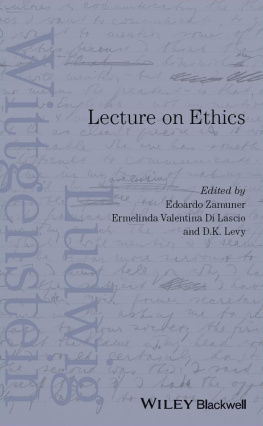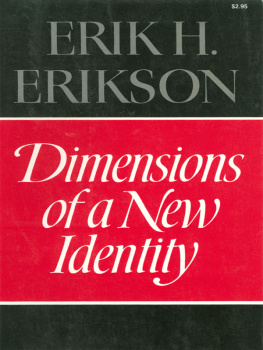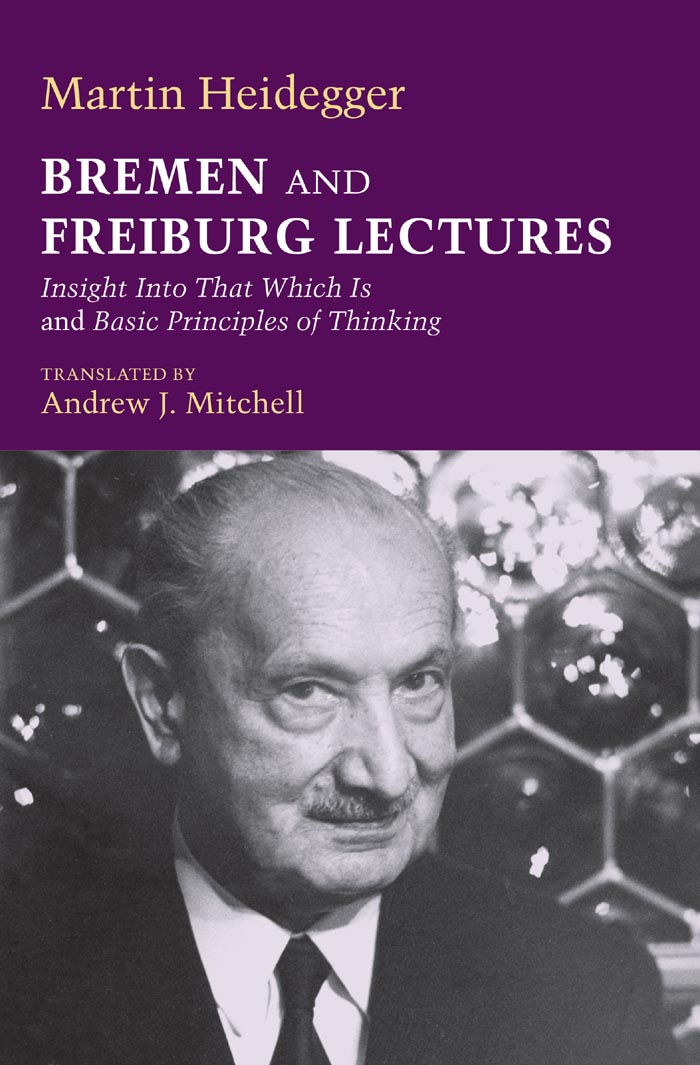Bremen and Freiburg Lectures
Bremen and Freiburg Lectures
Studies in Continental Thought
EDITOR
JOHN SALLIS
CONSULTING EDITORS
Robert Bernasconi
William L. McBride
Rudolf Bernet
J. N. Mohanty
John D. Caputo
Mary Rawlinson
David Carr
Tom Rockmore
Edward S. Casey
Calvin O. Schrag
Hubert L. Dreyfus
Reiner Schrmann
Don Ihde
Charles E. Scott
David Farrell Krell
Thomas Sheehan
Lenore Langsdorf
Robert Sokolowski
Alphonso Lingis
Bruce W. Wilshire
David Wood
Martin Heidegger
Bremen and Freiburg Lectures
Insight Into That Which Is and Basic Principles of Thinking
Translated by Andrew J. Mitchell
Indiana University Press
Bloomington and Indianapolis
This book is a publication of
Indiana University Press
601 North Morton Street
Bloomington, Indiana 47404-3797 USA
iupress.indiana.edu
Telephone orders 800-842-6796
Fax orders 812-855-7931
Published in German as Martin Heidegger,
Gesamtausgabe 79: Bremer und Freiburger Vortrge
Edited by Petra Jaeger
1994 by Vittorio Klostermann, Frankfurt am Main
English translation 2012 by Indiana University Press
All rights reserved
No part of this book may be reproduced or utilized in any form or by any means, electronic or mechanical, including photocopying and recording, or by any information storage and retrieval system, without permission in writing from the publisher. The Association of American University Presses Resolution on Permissions constitutes the only exception to this prohibition.
 The paper used in this publication meets the minimum requirements of the American National Standard for Information SciencesPermanence of Paper for Printed Library Materials, ANSI Z39.481992.
The paper used in this publication meets the minimum requirements of the American National Standard for Information SciencesPermanence of Paper for Printed Library Materials, ANSI Z39.481992.
Manufactured in the United States of America
Library of Congress Cataloging-in-Publication Data
Heidegger, Martin, 18891976.
[Bremer und Freiburger Vortrge. English]
Bremen and Freiburg lectures: insight into that which is and basic principles of thinking / Martin Heidegger; translated by Andrew J. Mitchell. p. cm. (Studies in Continental thought)
ISBN 978-0-253-00231-0 (cloth: alk. paper) ISBN 978-0-253-00716-2 (electronic book) 1. Knowledge, Theory of. 2. Ding an sich. 3. Thought and thinking. 4. Reasoning. I. Title.
B3279.H48.B7413 2012
193dc23
2012008012
1 2 3 4 5 17 16 15 14 13 12
CONTENTS
T RANSLATORS F OREWORD
This translation brings two key lecture cycles from Heideggers later thinking to an English-language readership. Published as volume 79 of Heideggers Gesamtausgabe (Collected Edition) in 1994, Insight Into That Which Is of 1949 is Heideggers first speaking engagement after the Second World War, and Basic Principles of Thinking from 1957 is his last extended lecturing engagement at Freiburg University. The texts taken together provide a panorama of the issues at stake in Heideggers late thinking.
In many respects the Bremen lectures inaugurate the late period of Heideggers thinking. It is here that he first formulates his conception of the thing as a gathering of the fourfold (das Geviert) and of technology as a matter of positionality (das Gestell). This basic tension in Heideggers thought between a singular existence and the drive to replaceability is first articulated in these pages in a manner that is uncompromising if not, at times, shockingly blunt, especially in treating recent events from the war. In no uncertain terms, Heidegger announces the era of technological circulation to be a break with that of modern metaphysics and its conception of representational objectivity. The profundity of Heideggers thinking, however, lies in his refusal to construe singularity and replacement as two separate orders of existence, but instead to understand them as mutually dependent upon each other. The thing needs the standing reserve to be what it is.
The 1957 Freiburg lectures, Basic Principles of Thinking, were the third and final installment in something of a trio of lecture courses Heidegger delivered in Freiburg on the topic of thinking (What Is Called Thinking? of 195152 and The Principle of Reason from 195556 being the earlier two). Here Heidegger traces the notions of being and thinking as operative in dialectical thought back to their roots in the Greek conception of the . From the Aristotelian conception of a and its principle of grounding, however, Heidegger proposes a leap into the abyss whereby is understood more primordially (via Homer) as saying (sagen). Heideggers concluding ruminations on the interconnection of being, language, and thinking are some of the most provocative of his career.
Both of these cycles taken together portray a world that is always arriving, a fragile world shadowed by danger, but a danger that likewise allows us to belong to that world. They present us with a vision of being as arriving, of things as dancing, and of language as an abyssal realm of appearing. Further details concerning the delivery of the lectures and the state of the manuscripts can be found in the German editors afterword below (16771).
A few of the translation choices in the lectures that follow warrant further explanation here. Additionally, full German-English and English-German glossaries are supplied after the main text. The following remarks sketch some of the conceptual considerations motivating the translations indicated, arranged here largely in order of appearance:
Das Geviert / the fourfold
The word names a gathering of four (earth, sky, divinities, mortals), the bringing together of four parties. How these elements hold together is articulated through the gathering power of the German prefix Ge- (also to be heard in Ge-Stell, positionality, the gathering or collection of all puttings and placings, of modes of stellen). Nowhere is the operative force of this Ge-ever named a fold or folding. Of a literal fourfold (Vierfalt), Heidegger here does not speak. Thus, a neutral term like foursome would be preferable to fourfold, which makes some unwarranted assumptions about the nature of the Geviert. Nevertheless, external considerations and unsavory associations lead to the retaining of fourfold to translate Geviert. To be sure, there is much mention of folding in the essay The Thing, where the term Geviert first arises, but that is due to the repeated use of the term Einfalt. One must simply bear in mind that each of the four come together in a single fold and not in any multiplicity of folds as one might wrongly hear in the term fourfold (see GA 79: 12/11).
Die Einfalt / the single fold
The word identifies the simplicity of naivete, guilelessness. The Einfalt is not complex, though the English language does not have a word like uniplex, which is what the literal sense of the word leads us to think. It is the simplicity of a fold. Earlier translations elided the distinction between Einfalt and Einfach in Heideggers work. Where the difference was remarked, it was often explained with the emphasis on the Ein as simple oneness. This attributes too much weight to the unifying force of the Ein, while Heideggers emphasis here falls much more on the fold. The term itself emerges in the text in response to an act of folding: the four are folded into a single fourfold [in










 The paper used in this publication meets the minimum requirements of the American National Standard for Information SciencesPermanence of Paper for Printed Library Materials, ANSI Z39.481992.
The paper used in this publication meets the minimum requirements of the American National Standard for Information SciencesPermanence of Paper for Printed Library Materials, ANSI Z39.481992.